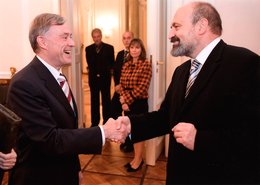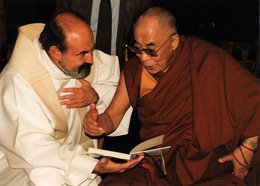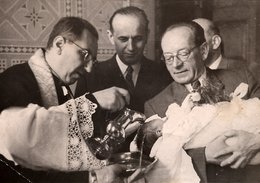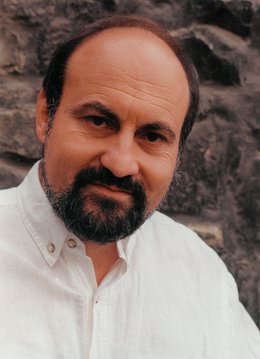Statement at press conference, British Academy, London on March 13th 2014
When St Augustine was asked which three paths led most surely to God, he replied “the first is humility, the second is humility and the third is humility”. Becoming a Templeton Prize winner is a great test of humility. When I read in the list of all previous winners names, which, for years, I have spoken with respect and admiration, I certainly felt small and humble when compared with them. Thank you for this opportunity to experience humility so profoundly.
I would like to recall with gratitude today my teachers of philosophy and theology, many of whom spent long years in Communist prison camps and had very little opportunity to write or publish. I am grateful to them for their intellectual, spiritual and moral inspiration, for their witness of faith, courage, perseverance and wisdom. They each bore a cross whereas I today am able to experience the joy and light of the Easter morning, the resurrection of freedom.
This enormous honour obliges me to carry forward this light and joy for all people of good will.
I am glad that London is the place chosen for today’s event. Ever since my first steps along the path to Christian faith I have been profoundly influenced by the distinguished tradition of English Christianity from the mediaeval mystics to the thinkers and novelists of the 20th century. The works of Chesterton and Graham Greene demonstrated to me the paradoxical aspect of Christianity. I am deeply convinced that the chief task of faith and theology is to teach us the art of living amid life’s paradoxes and the courage to enter the cloud of unknowing.
The world we live in is deeply ambivalent and full of paradoxes, and therefore it offers scope for various interpretations, both religious and atheistic/on the part of believers and atheists alike. Pascal wrote that there is light enough for those who wish to believe and darkness enough for those who choose the other alternative. God does not take away from us the freedom and responsibility implicit in our choice. Nevertheless, in my books and lectures I seek to show respect for those who have difficulties with many aspects of present-day religion and atheism. In today’s world we encounter a vociferous and self-assured religious fundamentalism as well as a no less arrogant and equally naïve militant atheism. I regard both these extremes, which greatly resemble each other, as a blind alley of cultural evolution. My heart is on the side of those who are seekers. Among believers there are many people whose faith is not a buttressed fortress but a path. They respond to the call to go deeper and deeper. And likewise, among those who do no consider themselves believers there are many who are not dwellers in the house of dogmatic atheism and who are not blind to life’s spiritual dimension. They too are seekers. Moreover, many of those who “wrestle with God” are probably closer to God than many conventional and conformist believers. For anyone who reads the Bible it doesn’t come as a surprise that God loves those who wrestle with Him. Thanks to Cardinal Newman I came to realise that tradition is a dynamic process of constant re-interpretation of the fundamentals of the faith. I felt a close affinity with John Henry Newman both as a churchman and an academic. I am convinced that today’s church ought to be inspired by the idea of the mediaeval university. The university was then perceived as a community of teachers and pupils, a community of life, study and prayer. Truth was to be sought by means of free discussion – where everything could be propounded as a “questio disputata”. Nevertheless a crucial principle was the linkage between intellectual activity and the spiritual component of life: Contemplata alliis tradere.
Cardinal Newman’s emphasis on dignity and the priority of conscience deeply resonated with my Czech cultural heritage, influenced by Jan Hus, who was a martyr of conscience.
One indication of the truthfulness and maturity of a faith is the extent to which a faith creates space for conscience, the extent to which it illuminates, encourages and fortifies. A mature faith helps conscience mature; an immature faith does not trust conscience and demands simplistic, black-and-white answers to complex questions.
St Augustine asks: where can I invite you to, my God? My answer is a humble prayer: “My God, loving Father of all people, enter the sanctuary of our consciences and teach our conscience to listen to Your voice. Teach us to understand understand what you say amid the noise of the world. Teach us to read and understand the signs of the times!”
If I understand rightly Sir John Templeton’s purpose, he sought to create from generation to generation, regardless of national, cultural and religious boundaries, a community of men and women, who have tried to understand the signs of the times in their epoch and to open their minds and hearts to the blowing of the spirit.
Today I enter humbly and with gratitude into this community of men and women whose first members included such saintly individuals as Mother Teresa and Brother Roger Schutz. There is one thing maybe that unites us all in spite of our differences. It is the idea that inspired Sir John Templeton’s noble undertaking. Namely, the awareness that it is necessary for the life of individuals and society constantly to cultivate the spiritual dimension. The common dwelling of our civilisation would be cold and inhospitable were the fire of the spirit absent from it. Reason is a great gift from God, and science and technology are among the pillars of our civilisation, but rationality without any spiritual and moral impulses from the depths of faith, could be a dangerous explosive. My intention is to donate the prize money to an endowment fund for education in my branch of learning, and partly to charity. The chief mission of the endowment fund will be to finance the activity of a newly-founded Institute for Dialogue attached to the Czech Christian Academy. The mission of the Institute will be to support ecumenical and inter-religious dialogue and also dialogue between believers and advocates of secular humanism, offering opinion makers in secular society, in particular, reliable knowledge in the field of religion and assisting representatives of religion to pursue dialogue with non-believers and those of different beliefs, supporting the ideas of religious freedom and acting against the misuse of religion to propagate hatred and justify violence. The Institute will support the study of the ethical and spiritual aspects of the life of contemporary society – in culture, science, politics and the economy.
In a novel by the Czech writer Karel Čapek, the inventor of an explosive substance eventually receives an instruction: “You wanted to do great things and you’ll do small things instead. You will do something that will bring light and warmth.”
At the time of the “Velvet Revolution”, twenty-five years ago, my friend Václav Havel expressed the hope that “truth and love” would triumph over lies and hatred. That is an enormous and difficult task for the entire remainder of history. In the rest of my life I would like to do some small things that would bring light and warmth to people in our world.
So help me God.



